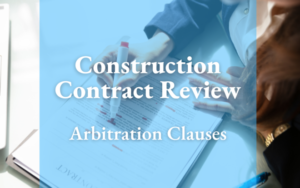If You Don’t Want Arbitration, Make That Clear in Your Contract!
Resolving construction disputes through arbitration may be preferable under certain circumstances. I won’t go into the pros and cons of arbitration versus litigation, but one of the negatives of arbitrating a dispute is that the parties have to pay for the arbitrator(s) time. For larger construction disputes, the cost for the arbitrators is relatively small compared to the amount in dispute. And frequently, the extra cost to have arbitrators with significant construction experience is worth it for larger disputes. But for smaller disputes, the extra cost can be hard to justify and may discourage claimants from prosecuting their claim. In those situations, it may be smart to strike out any provision in a contract requiring the arbitration of disputes between the parties.
For example, if you are a subcontractor with a relatively small contract amount, it is unlikely that you will ever have a claim that is large enough to justify the expense of paying an arbitrator to consider the dispute. In that situation, it may be wise to strike any requirement in the contract to arbitrate, rather than litigate, any disputes.
If a contractor, subcontractor, or other project participant wants to strike an arbitration clause, they must make it 100% clear that disputes will not be resolved through arbitration. If there is any ambiguity as to whether the parties agreed to litigate their disputes in court instead of arbitration, courts will frequently send the dispute to arbitration.
This is exactly what happened in a recent payment dispute between a general contractor and subcontractor arising out of a federal government project in Virginia (Concrete, Inc. v. SB Ballard – Memorandum Opinion). The subcontractor sued the general contractor and its surety for about $500,000 in damages due to the general contractor’s alleged breaches of their contract. The parties’ contract had a provision that required disputes to be arbitrated. The subcontractor made revisions to that clause, including striking out portions of the arbitration provision that the subcontractor thought required arbitration.
The subcontractor made the following changes to the arbitration clause (the portions that are crossed out below were crossed out by hand):
13. CLAIMS AND DISPUTES…(B) The Subcontractor agrees that at the sole option of [the general contractor] all other disputes not included in subparagraph (A) above, shall be litigated in the Circuit Court for the City of Norfolk, Virginia; the Circuit Court for the City of Virginia Beach, Virginia; or the United States District Court for the Eastern District of Virginia, Norfolk Division unless otherwise required by the General Contract. The parties hereby expressly consent to the jurisdiction and venue of said courts.Subcontractor waives trial by jury. [general contractor], at its sole discretion, may request or withdraw a request for a trial by jury.(C)At the sole discretion of[general contractor], claims included in subparagraphs (A) or (B), above, shall be arbitrated.If[general contractor]determines that resolution of any dispute between the Subcontractor and[general contractor]shall be made in such manner, litigation pursuant to subparagraph (B), above, shall not be permitted. Further, Subcontractor agrees, if requested by [general contractor], to participate in mediation or in any arbitration or other form of alternative dispute resolution procedure between [general contractor], the Owner, or other party that in any way arises out of or relates to the Subcontract Work. If arbitration is the forumchosen by [general contractor] in its sole discretionagreed by all parties, it shall be conducted in Norfolk, Virginia….
The subcontractor argued that it did not agree to arbitration because “the last sentence should be interpreted as: ‘[I]f the parties agree to arbitration, then the arbitration shall be conducted under AAA Rules in Norfolk, Virginia.’” As such, the subcontractor believed “this last sentence implies that arbitration is only proper if agreed to by all parties.”
On the other hand, the general contractor and surety contended that the parties agreed to arbitration because “the Subcontract states that ‘claims included in subparagraphs (A) and (B) above, shall be arbitrated.’” Further, the general contractor and surety asserted that the subcontractor’s interpretation “ignores the phrase that ‘[t]he Subcontractor agrees that at the sole option of [the general contractor] all other disputes not included in subparagraph (A) above, shall be litigated….’” As such, the option to arbitrate belonged solely to the general contractor and the subcontractor couldn’t avoid arbitration.
Ultimately, the court decided that the parties agreed to arbitration. The court reasoned that even if the above arbitration clause was ambiguous, the provision would have to be interpreted in favor of arbitration under the Federal Arbitration Act. The court noted that “the Federal Arbitration Act … ‘establishes that, as a matter of federal law, any doubts concerning the scope of arbitrable issues should be resolved in favor of arbitration, whether the problem at hand is the construction of the contract language itself or an allegation of waiver, delay or a like defense to arbitrability.’” Thus, the court stayed the lawsuit pending the outcome of the arbitration of the dispute.
Bottom Line: If you are a contractor, subcontractor, or other project participant that does not want to arbitrate future disputes, you need to make that 100% clear in your contract. If you don’t, it is very likely you will have to arbitrate the dispute and incur the fees and costs that come with arbitration.
By Joseph Darr


